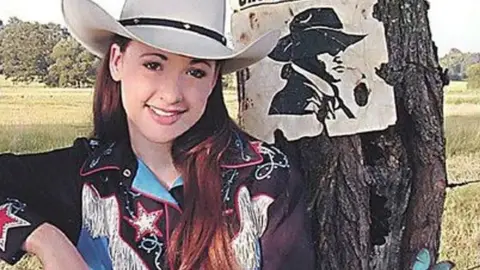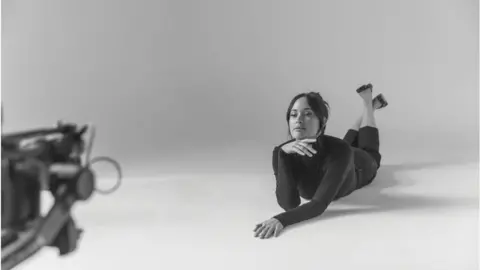Kacey Musgraves: 'The cliché of the tortured musician is a farce'
 Getty Images
Getty ImagesStillness isn't a quality you'd normally associate with country music.
As a genre, it tends towards the big emotions: Turmoil, trauma, tortured romance, rage, despair and hard-won truths.
But Kacey Musgraves has never been the sort of person to accept country orthodoxy.
She's always done her own thing, whether its adding psychedelic disco vibes to her 2018 album Golden Hour, or casually embracing same-sex love on one of her most popular songs, Follow Your Arrow ("Kiss lots of boys / Or kiss lots of girls / If that's something you're into").
After 2021's experimental, post-divorce record Star-Crossed, her latest album Deeper Well marks another artistic swerve - towards stillness and serenity.
"I'm glad it comes through in the music, because it's where I really feel that I am in my life," she tells the BBC. "I'm 35 now and there's a peacefulness I've felt as I've gotten older."
Part of the process has involved cultivating a more positive lifestyle.
On the album's title track, she sings about cutting off an acquaintance who possesses a "dark energy", and giving up her daily fix of weed.
"It's natural when things lose their shine," she sings, "so other things can glow."
Contentment continues on the Zen-like ballad Sway, where she takes a walk through nature, shedding her anxieties and surrendering to fate, "like a palm tree in the wind".
 Kelly Christine Sutton
Kelly Christine SuttonAnd Dinner With Friends lists the simple things that please her: Catching a sunrise, the first fireflies of summer, and her home state of Texas ("but none of their laws").
Writing from a place of happiness, she says, is a "fun challenge".
"It can easily become cheesy," she explains, "but I think, as musicians, we're sold this lie that we have to suffer to create good art and that's such a farce.
"It's dangerous, too, because it means that a lot of people hold on to their suffering far longer than they should. They're scared that if they let go of it, they're not going to create decent art - but suffering is just one colour on the wheel.
"It can definitely be inspiring, but some of my favourite songs come from when I'm genuinely peaceful and really happy."
Yodel champion
Musgraves was born in the tiny town of Golden, Texas, and has been making music since she first picked up a mandolin at the age of eight.
As a child, she was a champion yodeller, and sang the national anthem at the 2002 Winter Olympics - but it was her songwriting that really caught people's attention.
In her teens, her parents paid for her to record three independent albums, while her grandmother worked as a live agent, calling up venues and telling them they just had to hear her granddaughter's voice.
 Kacey Musgraves
Kacey MusgravesAfter high school, Musgraves moved to Austin and became a working songwriter, supplying tracks for the TV show Nashville and supplementing her income by dressing up as Cinderella and painting kids' faces at birthday parties.
Then, in 2012, one of her songs, Mama's Broken Heart, was recorded by Miranda Lambert and reached number two on the US country charts.
The success helped her secure a record deal of her own, and her major-label debut, Same Trailer, Different Park, went on to win the Grammy Award for best country album.
Even then, she was testing the boundaries of country music - singing about drug use and small-town hypocrisy, despite the advice of her record label boss to tone the lyrics down.
"He literally said, 'You know, Kacey, sometimes in business you just gotta do some things you're not proud of,'" she told fans at a listening event earlier this month. "I said, 'I don't want to play it safe... I don't respect that at all'."
The attitude paid off. A liberal star in the conservative world of country, Musgraves has attracted fans who'd previously felt alienated by the genre; and won over pop audiences by touring with Harry Styles and writing campy disco anthems like High Horse and the blissed-out love song Oh, What A World.
Both songs featured on the breakthrough Golden Hour album, which was written as she fell for her then-husband, Ruston Kelly - who she says opened her mind "to a kind of love I never really envisioned for myself".
 Getty Images
Getty ImagesWhen the Grammys named it album of the year, Musgraves looked bewildered. "What?" she declared over and over again, clutching her purse to her chest.
But unexpected as it was, the award changed her outlook.
"When you win something like that, you can go one of two ways. You can develop a scarcity mindset of, 'Oh my God, everything else I do after this has to achieve the same thing or I'll see it as a failure'. Or you can look at it as validation for following no compass other than your own.
"I sort of went in the latter direction. I would rather someone says, 'OK, this album's not really for me, I'll catch her on the next record', than try to remake Golden Hour eight times."
Star-Crossed fitted that brief almost too well. Sequenced as a Greek tragedy, it chronicled the end of her marriage, and was often as confusing as the emotions it tried to capture.
Musgraves leaned further into 21st Century pop production, employing auto-tune and synthy electronics; but the good songs (Breadwinner, Camera Roll) were outnumbered by ones that failed to connect.
"It was the record it needed to be and if it wasn't everyone's favourite, I really don't care because it was enjoyable for me to make," she reflects.
 AFP
AFPSome critics have framed Deeper Well as a "back-to-basics" reset after Star-Crossed's muted reception - but the slower pace and the stripped-back instrumentation are simply reflective of her state of mind.
After clearing the clutter of her personal life, she turned to meditation and micro-dosing psilocybin to unburden her mind. The star is now at a stage of life where she'd rather get up to see the sunrise, or take a walk with a friend, than stay up all night partying.
A simpler existence calls for simpler music and, working in the cosy attic space of Jimi Hendrix's Electric Lady studios, Musgraves began to chisel away at her ideas.
"I like adding too much and then slowly clearing the space away until it hits that perfect balance of negative space and decoration," she says.
"Even when it comes to the lyrics, my favourite kind of writing is the most conversational, the most ordinary, the most plain.
"I'm always trying to challenge myself to pare it down even more. I get my initial idea on the paper, and it might be sort of clunky and then I refine and refine until it gets as simple as possible - so that it sounds exactly like you would say it to the person sitting in front of you."
 Kelly Christine Sutton
Kelly Christine SuttonBut not all of the songs were created this way. One of the album's highlights is The Architect, in which Musgraves takes stock of the world around her and ponders the existence of God.
A pensive and searching waltz, it was prompted by the horrific Covenant School shooting in Nashville last March, which left six dead.
Musgraves was in the studio with her collaborators Shane McAnally and Josh Osborne at the time, "and it felt silly, to be honest, trying to write a write a song while there were parents grieving their children within a five-mile radius".
The tragedy prompted a debate about the existence of God in a world where such a senseless loss of life could happen.
"I would like to think that the Universe has a flow to it, but when something like that happens, it's just so perplexing. If there is a point to any of this, why are all these people suffering?" she says.
As the musicians talked, Musgraves glanced at the apple she was holding, and it seemed even more absurd. Who would create something "so beautiful and perfect" then allow children to die?
"And Josh goes, 'Yeah, can I speak to the architect? What's going on here?'"
It's a question that Musgraves, for all her newfound tranquillity, still wrestles with.
"Is there a plan? Is there a blueprint? Or is this all just completely random and we're dropped into a bucket and shaken up every day at random?"
She likes to think not.
Some of Deeper Well's most entrancing songs find Musgraves opening up to love again after her divorce, and considering her subsequent relationship with poet Cole Schafer.
Although the couple parted ways last November, she still believes in love as the Universe's ultimate power.
"It's so palpable," she says. "People entirely change the course of a bloodline by falling in love. It's this invisible force that keeps things moving throughout time.
"That's what I would say God is, if someone asked me."
Kacey Musgraves' album is out now. She starts her world tour in Dublin on 28 April.

- WHO ARE THE NEW POSH & BECKS? Join Lily Allen and Miquita Oliver for your weekly dose of unfiltered chit chat!
- HOW TO REDUCE YOUR STRESS LEVELS: The Music & Meditation Podcast has some helpful advice

